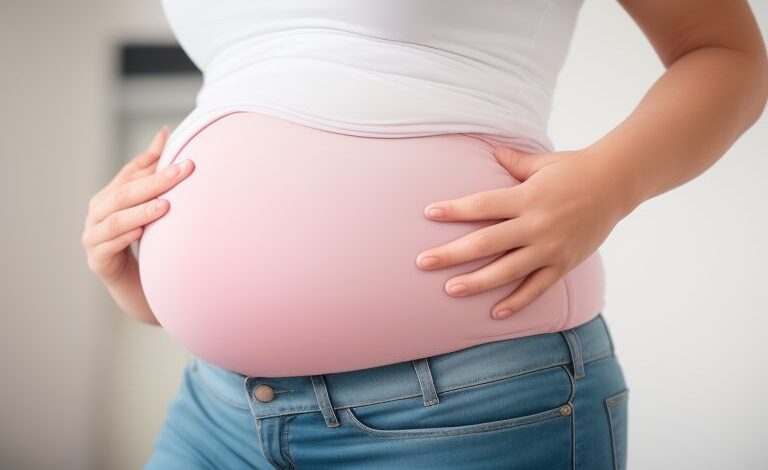Bloating a Week Before Period: Causes, Symptoms & Remedies

Bloating a Week Before Period: Causes, Symptoms, and Effective Remedies
Bloating a week before your period is a common symptom experienced by many women as part of premenstrual syndrome (PMS). For some, it may feel like a minor inconvenience, while for others, it can be a source of significant discomfort, affecting both physical appearance and emotional well-being. Understanding the causes of bloating before your period, recognizing the symptoms, and knowing how to manage it can make a world of difference in navigating this monthly challenge.

In this article, we’ll delve into:
- What causes bloating before your period
- Symptoms associated with pre-period bloating
- Practical tips to relieve bloating
- When to consult a healthcare professional
What Causes Bloating a Week Before Your Period?
1. Hormonal Fluctuations
The primary cause of bloating before your period is hormonal changes. About a week before menstruation, levels of progesterone and estrogen start to fluctuate. Progesterone, in particular, plays a key role in preparing the uterus for pregnancy. When this hormone declines, it leads to water retention and bloating.
2. Water Retention
During the luteal phase (the second half of the menstrual cycle), the body tends to hold on to more water and salt. This can cause noticeable bloating in the abdomen, hands, and even feet. Some women may gain up to five pounds during this time due to water retention.
3. Slower Digestion
Progesterone also affects the digestive system by slowing down the movement of food through the intestines. This can lead to feelings of bloating, constipation, and even gas. The slower digestion process causes the body to retain more gas, leading to the characteristic bloated feeling many women report a week before their period.
4. Dietary Factors
Certain foods can aggravate bloating before your period. Salt, sugar, and processed foods can cause the body to hold onto water. Dairy and caffeine may also contribute to bloating and digestive discomfort.
5. Changes in Gut Bacteria
Research suggests that gut microbiome fluctuations during the menstrual cycle may play a role in bloating. Hormonal changes can lead to an imbalance in gut bacteria, further contributing to digestive issues like bloating and gas.
Common Symptoms of Bloating a Week Before Period
Bloating before your period is not just about a swollen belly. It can be accompanied by other symptoms that may make the week leading up to your period particularly uncomfortable. Here are the most common symptoms:
- Abdominal Swelling: You may notice your stomach feeling larger or tighter.
- Weight Gain: Temporary weight gain due to water retention is common.
- Tenderness: The bloating may come with tenderness or sensitivity, especially around the abdomen.
- Constipation or Gas: Sluggish digestion can lead to either constipation or an increase in gas.
- Mood Swings: The discomfort from bloating can contribute to irritability and moodiness, common with PMS.
How to Relieve Bloating a Week Before Your Period: 10 Effective Remedies
While bloating is a natural response to the hormonal changes in your body, there are several effective strategies to help reduce and manage it.
1. Stay Hydrated
It may seem counterintuitive, but drinking more water helps combat bloating. When you’re hydrated, your body is less likely to retain water. Aim for at least 8-10 glasses of water per day to flush out excess salt and prevent bloating.
2. Limit Salt Intake
Too much sodium can lead to water retention, worsening the bloating. Avoid salty snacks, processed foods, and ready-made meals. Opt for fresh, whole foods and check food labels to keep your sodium intake low.
3. Eat Potassium-Rich Foods
Potassium helps balance sodium levels in your body and may alleviate water retention. Try incorporating potassium-rich foods like bananas, avocados, spinach, and sweet potatoes into your diet, especially in the week leading up to your period.
4. Avoid Carbonated Drinks
Carbonated drinks can introduce extra gas into your digestive system, increasing bloating. Instead, opt for herbal teas or water with lemon, which can help ease digestion.
5. Increase Fiber Intake
Fiber can promote healthy digestion and help prevent constipation, which often worsens bloating. Aim to include fiber-rich foods such as whole grains, vegetables, fruits, and legumes in your meals to support regular bowel movements.
6. Exercise Regularly
Regular exercise, even light activities like walking or yoga, can help reduce bloating. Physical activity encourages movement in the digestive system, preventing constipation and reducing fluid retention. Aim for 30 minutes of exercise most days of the week.
7. Take Magnesium Supplements
Magnesium is known to help with bloating and water retention. Some studies suggest that taking a daily magnesium supplement can reduce PMS symptoms, including bloating. Check with your healthcare provider before starting any new supplements.
8. Use a Warm Compress
Applying a warm compress or heating pad to your abdomen can relax your muscles and reduce bloating. The heat helps improve circulation and digestion, offering some relief from discomfort.
9. Reduce Caffeine and Alcohol
Both caffeine and alcohol can contribute to dehydration, leading to bloating and fluid retention. In the week before your period, try to limit these beverages and replace them with herbal teas or water.
10. Consider Probiotics
Probiotics support healthy gut bacteria, which may improve digestion and reduce bloating. Consider including yogurt with live cultures or a probiotic supplement in your daily routine to keep your gut flora balanced.
Can Bloating Be a Sign of Something More Serious?
While bloating before your period is common and usually harmless, there are cases where it could signal a more serious issue. If you experience severe or prolonged bloating, it’s important to consult with your healthcare provider. Some conditions that may cause bloating include:
1. Irritable Bowel Syndrome (IBS)
Women with IBS often report increased bloating and digestive discomfort around their period. If you experience chronic bloating with changes in bowel habits, such as diarrhea or constipation, you may have IBS.
2. Endometriosis
Bloating is a common symptom for women with endometriosis, a condition where the tissue similar to the lining of the uterus grows outside the uterus. If your bloating is severe and accompanied by heavy periods or pain during intercourse, it’s worth discussing with your doctor.
3. Ovarian Cysts
Ovarian cysts are fluid-filled sacs on the ovaries that can sometimes cause bloating and discomfort, especially if they are large or ruptured. Persistent bloating, along with pelvic pain or changes in menstrual cycles, may indicate the presence of ovarian cysts.
4. Food Intolerances
Certain food intolerances, like lactose or gluten intolerance, can lead to chronic bloating. If you suspect your bloating is linked to specific foods, consider keeping a food diary to identify triggers.
Frequently Asked Questions (FAQs)
1. Why do I get bloated a week before my period?
Bloating a week before your period is typically due to hormonal changes, particularly the drop in progesterone, which leads to water retention and slower digestion.
2. How long does pre-period bloating last?
Pre-period bloating can start up to a week before your period and usually subsides once menstruation begins or shortly after.
3. Can certain foods worsen bloating before my period?
Yes, foods high in salt, sugar, dairy, and caffeine can worsen bloating. Opting for whole foods, staying hydrated, and reducing processed food intake can help manage bloating.
4. Is bloating before my period normal?
Yes, bloating before your period is a common symptom of PMS and is usually nothing to worry about. However, if the bloating is severe or lasts for a prolonged period, it’s best to consult a healthcare provider.
5. Can I prevent bloating before my period?
While you can’t entirely prevent bloating, lifestyle changes such as staying hydrated, exercising, eating a balanced diet, and limiting salt and caffeine intake can reduce its severity.
Managing Bloating a Week Before Your Period
Bloating a week before your period can be an uncomfortable and frustrating experience, but it’s also a normal part of the menstrual cycle for many women. By understanding the underlying causes—such as hormonal fluctuations and water retention—and implementing simple remedies like staying hydrated, adjusting your diet, and exercising regularly, you can alleviate bloating and discomfort.
If bloating becomes severe or interferes with your daily life, it’s essential to speak to a healthcare provider. They can help rule out any underlying health issues and provide personalized advice to manage your symptoms effectively.
Take control of your pre-period bloating by making informed choices about your diet, lifestyle, and self-care practices!



